The 1986 World Cup in Mexico was the scene of one of the most memorable feats in the history of football. Argentina, led by a Diego Maradona in a state of grace, won their second World Cup with a team that blended talent, sacrifice and an unrepeatable dose of magic.
From the solid debut against South Korea to the epic final against Germany, the Albiceleste imposed their game with authority. But if there is one match that marked the tournament, it was the quarter-final against England: the Hand of God goal and the masterpiece of the Goal of the Century immortalised Maradona... But this World Cup is full of other stories...
PRELIMINARY
From the official World Cup logo, to its fabulous posters such as the one by photographer Annie Leibovitz, reproduced below, the 1986 World Cup was touched by the hand of God. Moreover, Mexico already had experience of organising World Cups, having hosted the 1970 one. We remind you that that 1970 World Cup was won by Brazil, beating Italy 4-1 in the final at the Azteca Stadium. With a legendary team led by Pelé, the Canarinha played brilliant, attacking football, considered one of the best in history. That victory allowed them to win the Jules Rimet Cup.
In other words, the background for the 1986 WC was already full of good stories for football.
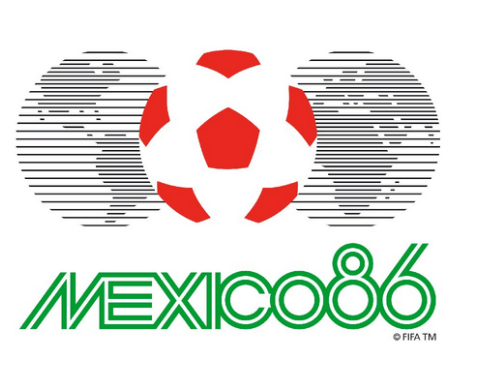
1986 WC in Mexico logo
This Mexico 86 Logo was chosen in 2019, in a vote organised by FIFA, as the best logo in the history of World Cups with 53% of the votes.
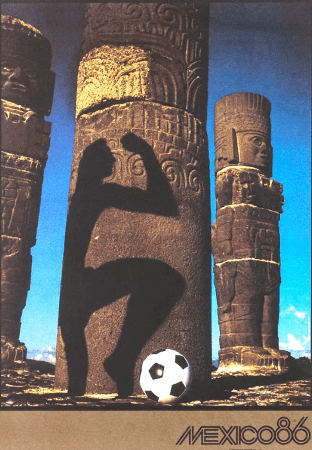
Poster Mexico 86 by photographer Annie Leibovitz
Who do you think is that shadow making the gesture of strength with a ball at his feet? Let's go step by step and see the details of everything that happened between 31 May and 29 June 1986, when all eyes in the world were on Mexico:
THE QUALIFICATION PHASE
The qualifiers for the 1986 World Cup were a football battle on every continent, with teams fighting for a place in Mexico.
In UEFA Europe, Germany, France, Spain, Italy and England sealed their passage, while Denmark surprised with attacking football and the Netherlands were eliminated by a Belgium side that would go on to excel.
In CONMEBOL South America, Brazil and Paraguay were solid winners, but Argentina's team struggled more than expected. The Albiceleste, with a team in transition, qualified after a tough South American qualifying campaign, securing their place in World Cup 86 with a key 2-2 draw against Peru, thanks to the bravery of Passarella and Ricardo Gareca.
Furthermore, in the previous match against Peru, Lucho Reyna marked Maradona in a match that will not be remembered for the quality of the play or the goals, but for the suffocating personal marking that Reyna imposed on El Pibe de Oro, The Golden Boy. This match came to represent Argentina's tough qualifying campaign and the insecurities that the team generated in La Albiceleste stands. Argentine fans were unhappy with the performance of the team led by coach Carlos Salvador Bilardo and even Maradona was criticised, which, seen in the rear-view mirror of time, seems surprising or unimaginable today.
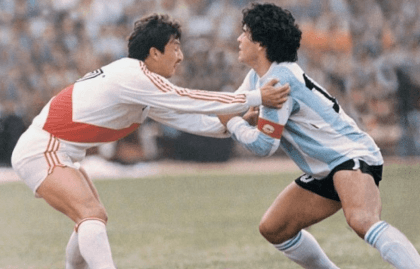
Reyna marking Maradona
Among the CONCACAF teams from North, Central America and the Caribbean, Mexico qualified directly as hosts and Canada made history by qualifying for the first time.
Among the CAF African teams, Morocco stood out with solid football and returned to the World Cup after 16 years. Algeria also qualified for the World Cup.
Asia AFC saw South Korea return to the tournament and Iraq make their debut, while in Oceania OFC, the battle was intense but no team qualified.
Thus, the world's best teams secured their place in the most eagerly awaited tournament.
THE GROUP PHASE
The group stage of the Mexico 86 World Cup produced some unforgettable moments. Brazil and Denmark played brilliant football, while the Soviet Union surprised with their attacking power. France struggled through a tough group and defending champions Italy failed to convince. Morocco made history by becoming the first African team to top their group, knocking out Portugal. England started with doubts, but Gary Lineker popped up with a hat-trick against Poland to seal qualification.
The Argentina team got off to a solid start on their way to glory. They opened with a 3-1 win over South Korea, with Maradona showing flashes of his talent as he set up three assists for his team-mates: to Valdano in the 6th and 46th minutes and to Ruggieri in the 18th minute.
Then, in a close match, they drew 1-1 against Italy with a cross-shot from El Pibe de Oro. Italy had to defend the title they had won at the World Cup in Spain in 1982, but they lost in the Round of 16.
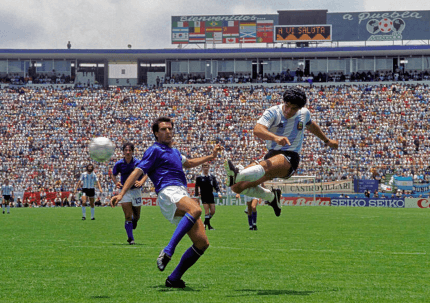
Maradona's goal against Italy
In the final group game, Argentina beat Bulgaria 2-0 with authority to secure top spot in the group. Valdano scored after three minutes, Diego Armando did not score, but it was he who provided the prodigious assist for Burruchaga's second goal in the 76th minute, sealing the match.
La Albiceleste showed convincing football, with Maradona on fire and a team that was beginning to establish itself as title contenders.
THE ROUND OF 16
The Round of 16 of World Cup 86 produced intense matches, unrepeatable episodes, some of which have gone down in football history.
Denmark, one of the revelations of the tournament in the group stage, having won all three of their matches - including their match against West Germany - and topping the group, were stunned and lost 1-5 to Spain, with a stellar performance by Emilio Butragueño, who scored four goals !
Hosts Mexico had a tough match against Bulgaria, winning 2-0 with a masterful scissor kick goal by Negrete, one of the most popular goals in World Cup history.
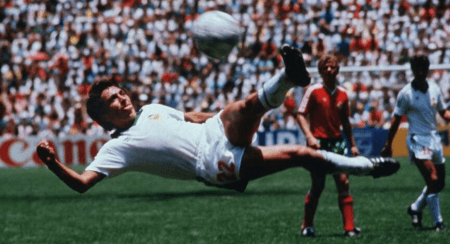
Negrete' goal - Mexico against Bulgaria
France and Italy played out another key clash, with the French, led by Platini, eliminating the reigning champions with a solid 2-0 win.
Morocco's dream came to an end in the Round of 16 after a narrow defeat to West Germany, who won with a single goal from Lothar Matthäus. It was a balanced, intense World Cup match.
England, with an inspired Gary Lineker, thrashed Paraguay 3-0, showing their best version.
The Round of 16 clash between Argentina and Uruguay was charged with great emotional tension, as it was a classic. That match even had a name: The Battle of the River Plate. The Argentinian team came from playing better than their opponents and that was not in their favour emotionally as they felt they were in for a tough match. In the end La Abiceleste eliminated La Celeste with a narrow 1-0 win thanks to a goal by Pedro Pasculli in the 42nd minute. Argentina were better positioned on the pitch, Uruguay ended up showing their World Champion spirit, although they did not manage to break down Nery Pumpido, the Argentinian goalkeeper.
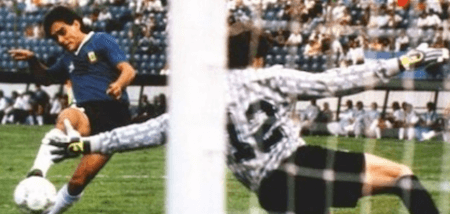
Pedro Pasculli's goal for Argentina against Uruguay
QUARTER-FINALS
Halfway through the World Cup, Argentina were already among the top eight teams Compared to the doubt-filled team that arrived in Mexico earlier, after the first part of the World Cup they felt completely different, more solid and with a renewed spirit. Although they had not shown their full potential, La Albiceleste entered the quarter-finals in high spirits thanks to their victories and with a clear strategy on the pitch. They still lacked the dynamic they would show in the final stages, but they knew exactly what to do, both in defence and attack, and looked to the future with confidence and optimism.
In the historic and unforgettable quarter-final between Argentina and England on 22 June 1986, Maradona carried the team on his shoulders. It seemed as if he took revenge for the goal he had disallowed against Uruguay, first creating a great move with his masterful dribbling and then appearing to finish off the ball Valdano had thrown into the goal from an aerial cross, to score the goal with his hand. A move that the referee missed and which has been called the historic Hand of God in the 51st minute. When the fans had still not recovered from the emotional impact of that goal in the 55th minute, Maradona surpassed himself and created what still seems like a dream, the Goal of the Century. He started from the Argentine midfield and beat five England players: Peter Beardsley, Peter Reid, Terry Butcher, Terry Fenwick and goalkeeper Peter Shilton. England's Lineker's third goal of the match in the 81st minute was only a consolation for the English after the final score of 2-1.
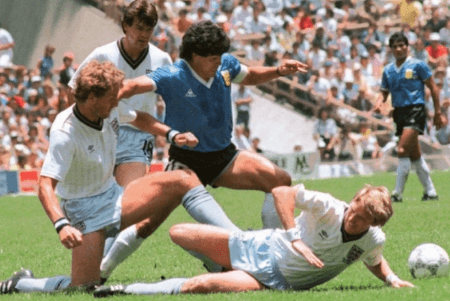
Maradona Goal of the Century against the England national team
In the other quarter-final matches, Brazil and France also played out a historic encounter. It was a clash that remains etched in the memory of all fans, both for the great football played by both teams and for the unstoppable attacking play of the 22 players. The match ended 1-1 after 90 minutes, with goals from Careca for Brazil and Platini for France. In the penalty shoot-out, the French won 3-4, eliminating Brazil and leaving one of the biggest surprises of the tournament.
Mexico, at home, was eliminated by West Germany after a 0-0 draw that went to penalties, where the Germans won 4-1 and the home team failed to overcome the Teutonic pressure.
Belgium pulled off a surprise by beating Spain 4-5 on penalties, after a 1-1 draw with goals from Señor for Spain and Ceulemans for Belgium in normal time. The Belgians played a flawless penalty shoot-out, scoring all their goals.
SEMIFINALS
Argentina beat Belgium 2-0 in the semi-finals of World Cup 86, with another brilliant performance by Diego Maradona. After a scrappy first half with few chances, the Argentine captain opened the scoring after an extraordinary pass from Burruchaga, in the 51st minute, with a goal with the outside of his foot, a great individual move inside the box.The Argentine star scored a seemingly effortless goal, so quickly that it is barely visible even on a video replay.
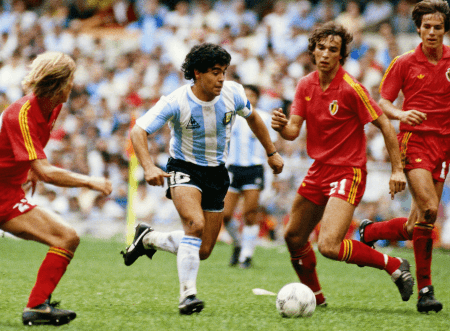
Maradona against Belgium in semi-final match
Just 12 minutes later, in the 61st minute, Maradona dazzled again with another stunning goal, dribbling past several Belgian players before again scoring expertly past goalkeeper Pfaff. It was a goal similar to England's second goal, the so-called Goal of the Century. With these masterful performances, Maradona was the star again, but we should not forget the accompaniment of Burruchaga, Batista or Valdano. What this match again made clear is that with Maradona in top form, Argentina was an almost unbeatable team. Belgium, who had just eliminated Spain, were unable to stop Diego's magic or find any attacking answers.
With this victory, Argentina advanced to the final, where they would face West Germany in search of their second World Cup.
Germany beat France 2-0 in the semi-finals in a match played at the Estadio Jalisco. Of the four teams that reached the semi-finals, Germany had played the least convincing football. However, Andreas Brehme opened the scoring early, capitalising on a glaring error by French goalkeeper Bats. Despite attempts by Platini in a centre-forward position and his team to react, the Germans controlled the game with defensive solidity. German goalkeeper Schumacher, with the help of an unbreakable defence of Rolff and Foerster, stopped the French team's onslaught. Rudi Völler sealed the match in the final minutes, securing Germany's place in the final against Argentina. It was an intense and physically demanding match, unfavourable to France's technical style, but perfect for Germany's strength and discipline.
THE FINAL
The final of the Mexico 86 World Cup between Argentina and West Germany was a match full of excitement and score changes.
Bilardo's Argentina went into the final with this squad: Pumpido, Brown, Cucciuffo, Ruggeri, Giusti, Olarticoechea, Batista, Enrique, Maradona, Burruchaga and Valdano.
Coach Beckenbauer's Germany team included Schumacher, Berthod, Forsters, Jakob, Brieghel, Brehme, Eder, Magath, Matthäus, Rummenigge and Allofs.
José Luis Brown opened the scoring in the 23rd minute with a header past the advancing Schumacher goalkeeper from a Burruchaga free-kick cross. With that 1-0 lead, La Albiceleste went into the break with the lead and Tata Brown with the unexpected honour of going down in history.
In the second half, Argentina widened the gap with a goal by Jorge Valdano, who received a great pass from Héctor Enrique, broke free on the left and scored with precision, a goal in which Valdano started as a right back and finished as a striker on the left in a perfect combination between Valdano, Maradona, Enrique and finally Valdano. His goal was a dream come true.
However, Germany reacted. First, Karl-Heinz Rummenigge scored Germany's first goal in the 74th minute from a corner kick. Then, in the 81st minute, Rudi Völler equalised after a corner from the left, in a move very similar to the first German goal, and it was clear that the experienced Germany were not going to be intimidated and equalised convincingly.
But Argentina had Maradona and on this occasion also Burruchaga. Just three minutes after the equaliser, Diego received the ball in midfield, surrounded by opponents and with no space. With a stroke of genius, he slipped a perfect pass to Burruchaga, who ran into the box and scored a cross-shot to make it 3-2 and crown Argentina World Champions, unleashing the celebrations of a historic victory. Argentina won their second World Cup title, after their first in 1978.
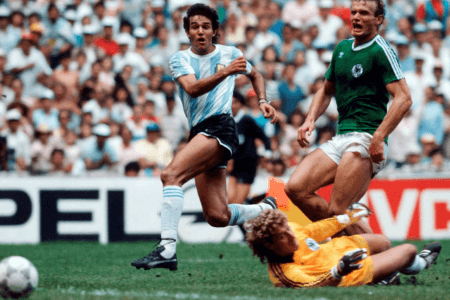
Burruchaga's goal for Argentina against Germany in the final of the World Cup Mexico 1986
The success at the 1986 World Cup in Mexico was the result of a perfect combination of talent, tactics and commitment. Led by Carlos Bilardo and with Maradona at a superlative level, the national team showed brilliant football full of character. From the stars to the less prominent players, everyone contributed to an unforgettable campaign.
The victory over West Germany in the final not only sealed the championship, but also made Maradona a football legend, an everlasting symbol in the history of the sport.
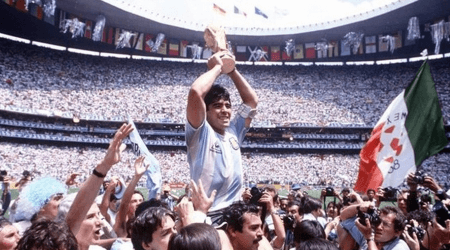
Maradona with the World Cup after the final of the World Cup Mexico 86
THE MARADONA ARGENTINA JERSEY OF THE 1986 WORLD CUP IN MEXICO
The shirts worn by Maradona and the rest of his teammates became true emblems of that historic victory that will always remain engraved in the memory of all football fans. Le Coq Sportif, the renowned French sportswear brand, was in charge of dressing the Argentina team in the 1986 World Cup, achieving a perfect interaction between fans and team.
Don't miss the opportunity to discover the Collection of Le Coq Sportif Argentina Maradona 1986 World Cup shirts, sweatshirts, slim trousers and to relive those historic moments, feeling part of that epic adventure.
Maradona 1986 Commemorative Jersey
Maradona 1986 commemorative sweatshirt
The Maradona 1986 shirt is the most loved by the fans of the Argentina team.
For many fans, whether Argentinian or not, wearing an Argentina and Maradona Mexico 1986 team jersey is a way of honouring his legacy. It is a symbol of the emotions, passion and pride that surrounded the World Cup conquest. This collection of Argentina World Cup Mexico 86 jerseys not only pays tribute to the past, but also unites new generations of fans who revere Maradona and the rich history of Argentine football.
 Retrofootball
Retrofootball  Belgium
Belgium  France
France  Germany
Germany  Italy
Italy  Portugal
Portugal  Spain
Spain  Switzerland
Switzerland  United Kingdom
United Kingdom  other countries
other countries  Retrorugby
Retrorugby 
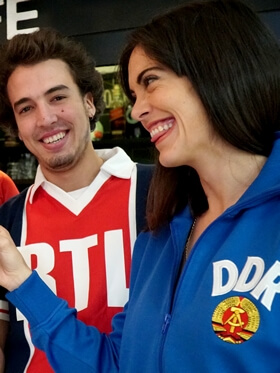
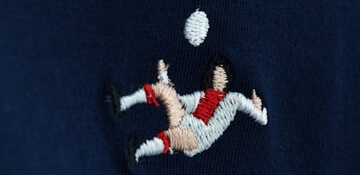





Post Comments